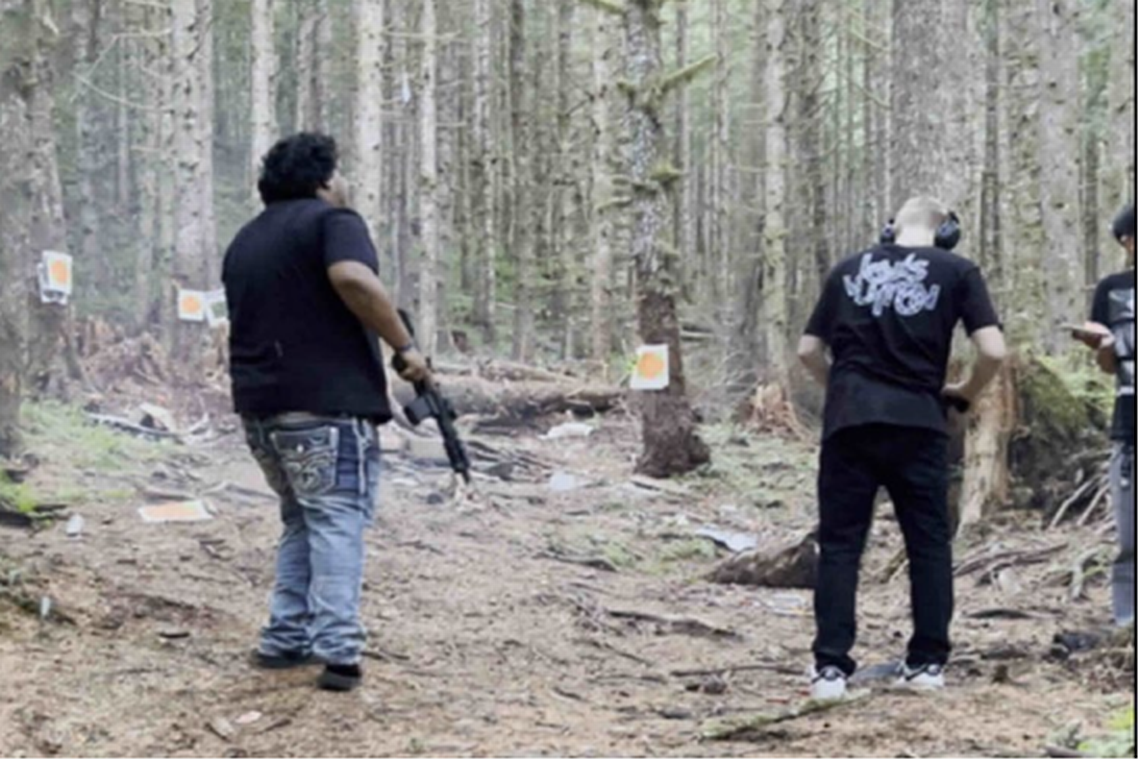Ghost guns, Fentanyl and migrant smuggling: Tacoma men sentenced as leaders of drug ring
Two Tacoma men were sentenced Wednesday in U.S. District Court to decades in prison for leading a violent drug ring that trafficked Fentanyl and other drugs from Mexico to Washington cities and other states across the country.
Caleb Carr, 23, and Hunter O’Mealy, 19, were sentenced in the Eastern District of Washington to 20 years in prison for conspiracy to distribute 400 grams or more of Fentanyl. Both men pleaded guilty to that charge in May.
To build and operate their drug organization, federal prosecutors said Carr and O’Mealy obtained untraceable homemade firearms known as “ghost guns,” purchased narcotics from a transnational cartel and even illegally transported migrants across the Mexican border.
While part of the drug ring, prosecutors said Carr and O’Mealy lived lavishly, traveling to concerts, hotels and parties with the money they were making. As business went on in 2021, members engaged in violence and intimidation. Records say the defendants were involved last year in the attempted murder of a Lakewood man in a shooting that left him paralyzed from the waist down. Prosecutors said members of the drug ring shot him because they falsely believed he was an informant.
The drugs trafficked by Carr and O’Mealy’s organization were killing people too, including a 15-year-old high school freshman in Idaho and a person in Graham. According to court records, that Idaho overdose is what first led the Drug Enforcement Administration and the United States Postal Inspection Service to begin their joint investigation into the “Fetty Bros Drug Organization.”
Another Washington man, Matthew Gudino-Pena, 21, was sentenced to 16 years, four months on the same conspiracy to distribute charge. In a sentencing memo, prosecutors said he often acted as security for drug shipments. Once their sentences are complete, the three men will be on supervised release for 10 years.
A fourth person involved in the drug ring, Jamie Bellovich, is to be sentenced Nov. 17. She pleaded guilty in May to conspiracy to distribute.

In drug seizures made between August and September 2021, investigators recovered about 12,851 grams of Fentanyl, 254 grams of cocaine, 592 grams of Benzodiazepine and 16.94 kilograms of marijuana, according to prosecutors’ sentencing memo.
But based on social media messages taken from Carr’s phone, prosecutors believe the organization distributed drugs such as counterfeit Oxycodone pills laced with Fentanyl in “far greater quantities” than what was ultimately recovered by investigators.
Carr and O’Mealy’s use of social media to advertise and distribute drugs and guns shows how Fentanyl is affecting communities throughout the US, prosecutors wrote in their sentencing memo. Drugs were distributed to Eastern and Western Washington, Alaska, Arizona, Idaho and Florida.
“The ease by which Defendants were able to connect to a transnational drug cartel and Defendants’ ability to easily market narcotics through social-media platforms demonstrates the challenges communities face in their efforts to curb drug abuse and addition,” prosecutors wrote.
It’s unclear how many firearms and how much ammunition were recovered, but photos from one seizure at a property Carr and O’Mealy had in Eatonville showed a large pile of rifles and handguns. Records state that investigators found a receipt for $2,318 to GhostGunner.net, which prosecutors said markets products for building firearms in your own home. The defendants also allegedly obtained switches to convert guns to fully automatic weapons.
To conceal their activities and launder drug proceeds, prosecutors said Carr and O’Mealy set up a luxury clothing business. According to charging documents filed in October 2021, a confidential informant told investigators that the two men had been selling drugs, guns and designer clothing out of a storage unit in Tacoma.
Court documents provided little info about Carr and O’Mealy’s involvement in transporting immigrants across the Mexico border, but records say it was how they funded their narcotics purchases from a transnational cartel.
“Defendant Carr used social media to solicit drivers to illegally transport migrants,” the sentencing memo states. “For example, in May 2021, Carr posted, “Need drivers to Tucson!!! Easy money fly in to az my people will get you a hotel and leave with 10k can’t make money quick easier then this!”
Eventually, Carr and O’Mealy learned that they were being tracked by law enforcement, and they fled to Arizona, where they tried to obtain fake IDs to escape to Mexico, records state. There, the defendants continued to obtain firearms in an apartment complex largely made up of college students near the University of Arizona.
To track the men, authorities used geolocation for Carr and O’Mealy’s phones obtained through search warrants and information from the confidential source, according to charging documents.
Carr, O’Mealy and Gudino-Pena were arrested in October 2021 in Tucson, Arizona. Bellovich was arrested the month prior while driving back to Washington state from Los Angeles. She was stopped on Interstate 5, and police found 6,000 pills suspected to be laced with Fentanyl along with other drugs in her car, according to court records.
